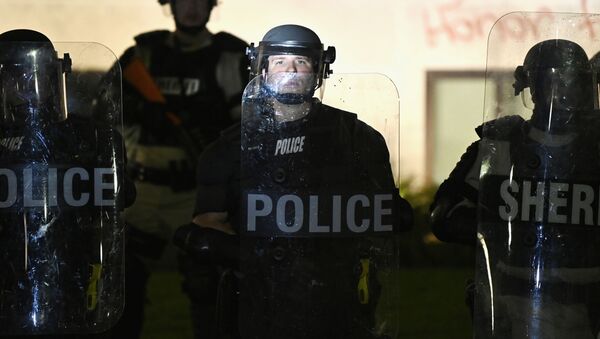Many netizens immediately pointed out that Kenosha police officers involved in the Sunday shooting of Blake were not seen wearing body cameras or similar surveillance devices that have been implemented in most police forces across the US.
Democratic Kenosha Mayor John Antaramian confirmed the lack of body cameras to reporters on Monday, also noting that, under current budget constraints, cops will not be equipped with the recording devices until 2022, according to NBC Chicago.
Democratic Wisconsin Governor Tony Evers announced on Monday that the state legislature will convene on August 31 to discuss a new police reform package that would be a step toward ending the “systemic racism built into all of our systems.”
I am urging the Legislature to rise to this occasion and give this special session the urgent and productive effort this moment demands and that the people of Wisconsin deserve. More on this announcement is available here: https://t.co/dkIqZc5T0H.
— Governor Tony Evers (@GovEvers) August 24, 2020
Democratic State Representative Jonathan Brostoff also put forward legislation explicitly demanding “body cameras on each and every police officer in the line of duty.”
Yesterday's shooting in Kenosha was a tragedy, and entirely avoidable. The time for meaningful reform action is now. You can read my statement below: pic.twitter.com/ICu0ieWVKG
— Rep. Brostoff (@RepBrostoff) August 24, 2020
“This is a tragedy. But at least some good could come from this if this is finally the incident where Kenosha says, ‘we’ve got to get body cameras on these cops right away,’” Kevin Mathewson, a former member of the city’s common council, told the Associated Press.
However, individuals close to the matter say that it will take more than just support for body cameras to enter use, as approval for the devices dates back to a unanimous 2017 endorsement from city and law enforcement leaders, according to AP.
Michael Bell Sr., the father of a 21-year-old who was shot and killed by Kenosha police officers in 2004, told AP that even though he has been able to help implement a state law requiring an outside investigation when someone dies by the hands of law enforcement, it is much harder to get body cameras to become a norm among local police in Kenosha.
“I feel that there has been no movement,” he asserted. “Every time they put [body camera funding] into the budget it’s been kicked downstream.”
Steven Casstevens, president of the International Association of Chiefs of Police, told the outlet that while there has been a push for widespread use of body cameras, current funding for the devices will not cover storage costs.
“There’s a demand to defund the police. Yet the flip side is that people are demanding body cameras,” he said. “You can’t have it both ways.”
Casstevens, who also serves as police chief of Illinois’ Buffalo Grove Police Department - roughly 40 miles south of Kenosha - revealed that he has asked US Vice President Mike Pence to help make more federal funding available for such expenses.
At the same time, he explained that even if authorities make the switch over to body cameras, the recording devices are only useful when an officer wearing one actually activates it.
Kenosha authorities’ shooting of Blake, an unarmed Black man, reignited race-related demonstrations and nationwide calls for police reform and the defunding of police departments.
Blake family attorney Ben Crump confirmed on Tuesday that Blake is paralyzed from the waist down following the Sunday shooting.


